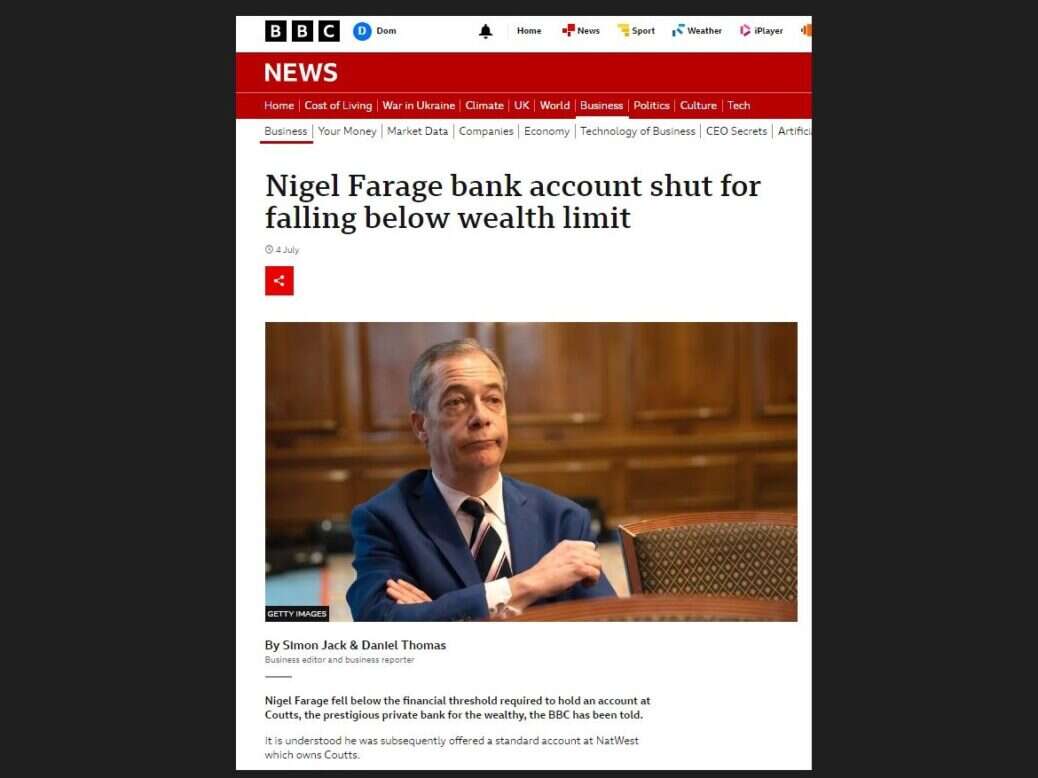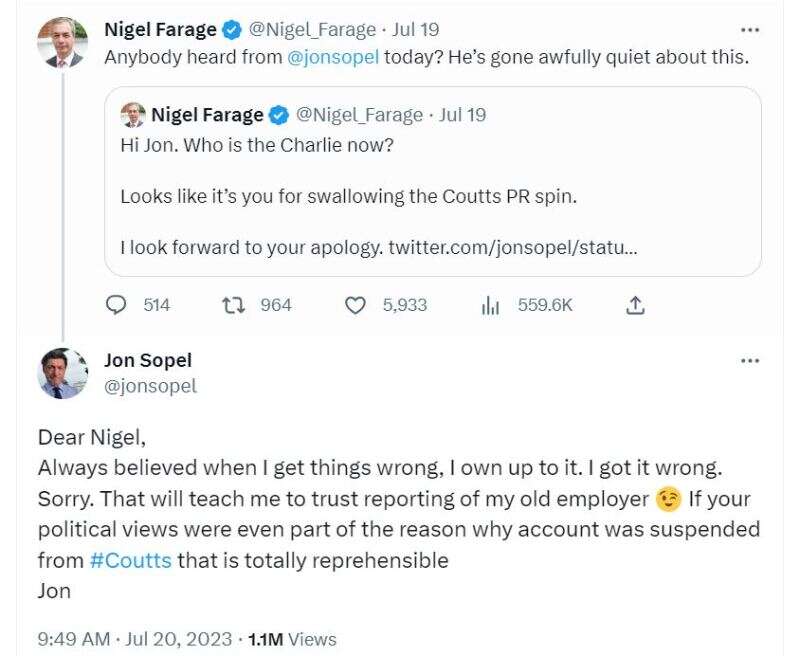
Update 2, 25 July: The chief executive of Natwest has admitted to being the anonymous source for BBC News business editor Simon Jack’s story, for which he and the corporation have now apologised to Nigel Farage.
And late on the evening of 25 July she decided to resign from her job.
In a statement, Alison Rose said: “I recognise that in my conversations with Simon Jack of the BBC, I made a serious error of judgment in discussing Mr Farage’s relationship with the bank.”
It had been believed that Rose was the likely source since The Telegraph reported she and Jack sat together at an awards event the night before his story was published.
Rose said: “Believing it was public knowledge, I confirmed that Mr Farage was a Coutts customer and that he had been offered a Natwest bank account. Alongside this, I repeated what Mr Farage had already stated, that the bank saw this as a commercial decision.
“I would like to emphasise that in responding to Mr Jack’s questions I did not reveal any personal financial information about Mr Farage. In response to a general question about eligibility criteria required to bank with Coutts and Natwest I said that guidance on both was publicly available on their websites. In doing so, I recognise that I left Mr Jack with the impression that the decision to close Mr Farage’s accounts was solely a commercial one.”
She added: “Put simply, I was wrong to respond to any question raised by the BBC about this case. I want to extend my sincere apologies to Mr Farage for the personal hurt this has caused him and I have written to him today.”
Natwest Group chairman Howard Davies said Rose had made a “regrettable error of judgement” and it would be taken into account when remuneration is being discussed, but that she retains the “full confidence” of the board. Hours later she resigned.
Update 24 July: The BBC has now issued an apology to Nigel Farage over its reporting of his bank account closure based on an anonymous source.
BBC business editor Simon Jack tweeted on Monday afternoon: “The information on which we based our reporting on Nigel Farage and his bank accounts came from a trusted and senior source. However the information turned out to be incomplete and inaccurate. Therefore I would like to apologise to Mr Farage.”
The BBC reported that BBC News chief executive Deborah Turness had also written to Farage to apologise. Farage reportedly said in response: “It’s not often that the BBC apologise. But for the BBC to apologise, I’m very, very pleased.”
An apology has also been published on the BBC’s corrections and clarifications page. Noting the story came from “a senior source familiar with the matter” it said: “We acknowledge that the information we reported – that Coutts’ decision on Mr Farage’s account did not involve considerations about his political views – turned out not to be accurate and have apologised to Mr Farage.”
Original story 21 July: The BBC has amended a report which stated Nigel Farage’s Coutts bank account was closed for financial reasons.
But it has so far stopped short of providing Farage with the apology he has demanded.
Former UKIP leader Farage first revealed in June that he believed his bank account had been closed for political reasons.
On 4 July, the BBC reported in an online headline: “Nigel Farage bank account shut for falling below wealth limit.”
The article quoted “people familiar with the Coutts’ move”, saying it was “a commercial decision”. The BBC report quoted an unnamed source as saying: “The criteria for holding a Coutts accounts are clear from the bank’s website.”
The article, by business editor Simon Jack and business reporter Daniel Thomas, has now been amended with the new headline reading: “Nigel Farage bank account shut for falling below wealth limit, source tells BBC.”
The article has also been given the following update: “Since this article was published, Nigel Farage submitted a subject access request to Coutts bank and obtained a report from the bank’s reputational risk committee.
“While it mentioned commercial considerations, the document also said the committee did not think continuing to have Mr Farage as a client was ‘compatible with Coutts given his publicly-stated views that were at odds with our position as an inclusive organisation’.
“We have amended this article’s headline to make clear that the details about the closure of Nigel Farage’s bank account came from a source.”
Farage used the Data Protection Act to demand Coutts release all files held about him. Some 36 pages of evidence were shared with the Daily Mail which make clear political and reputational considerations came into play when deciding to drop Farage as a customer.
Jon Sopel ‘sorry’ he trusted BBC reporting
The 4 July BBC report led to Farage being widely ridiculed on social media, including by former BBC journalist Jon Sopel who said on Twitter: “You must feel a bit of a Charlie if you’re Nigel Farage, and you claim that it’s all an establishment stitch up that your account’s been closed when it’s just you’re not rich enough for Coutt’s.
“Am thinking of starting a ‘go fund me’ page for Nige to get him his account back.”
Sopel has now tweeted an apology to Farage saying: “That will teach me too trust the repprting of my old employer” and stating the actions of Coutts were “totally reprehensible”.
Sopel’s initial tweet has been viewed some 3.2 million times while is apology has received just over one million views.

Chief executive of Coutts owner Natwest Group Dame Alison Rose has also apologised to GB News host Farage and HM Treasury has said it will tighten the rules around banks and account closures.
Simon Jack said on Twitter today: “The headline on the Farage story has been clarified and an update posted. It should have been clearer at the top that the reason for Mr Farage’s account being closed was commercial – was what a source told the BBC. That has been corrected.”
BBC use of anonymous sources again in question
Meanwhile, Rose faces questions over whether she was the source for the inaccurate 4 July BBC report.
The Telegraph has reported that Jack sat next to Rose at a dinner on 3 July.
And Farage has said: “I want to know, did Alison Rose breach my client confidentiality? Did she break GDPR rules?”
The BBC has not responded to a question from Press Gazette asking whether the 4 July report will be subject to a formal standards investigation.
[Read more: When is off the record out of order?]
In the run up to the 2003 Iraq war many journalists felt they were deceived by intelligence sources who insisted on remaining anonymous and misled them about Saddam Hussein’s capacity to use weapons of mass destruction.
The BBC’s editorial standards state: “All BBC output, as appropriate to its subject and nature, must be well sourced, based on sound evidence, and corroborated.
“We should be reluctant to rely on a single source. If we do rely on a single source, it should be credible, and a named, on-the-record source is always preferable.”
Email pged@pressgazette.co.uk to point out mistakes, provide story tips or send in a letter for publication on our "Letters Page" blog
